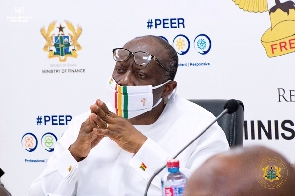 Finance Minister, Ken Ofori-Atta
Finance Minister, Ken Ofori-Atta
Government recorded a fiscal deficit of 7.4 percent of Gross Domestic Product for the first seven months of 2020 ie January to July.
This is marginally higher than the 7.2 percent target for the deficit over this period and suggests that even the record high fiscal deficit target for this year, forced upon government by the extraordinary circumstances and impact of COVID 19, may be hard to achieve.
It is instructive that the higher than targeted fiscal deficit was the result of higher than budgeted expenditure rather than revenue shortfalls. Between January and July this year, total revenue and grants amounted to GHc27.7 billion which is higher than the GHc26.8 billion expected over the period. However, total public expenditure and arrears clearance amounted to GHc56.2 billion, which is higher than the GHJc53.3 billion targeted.
Consequently, the primary balance deficit of 3.7 percent was significantly higher than the 3.4 percent deficit targeted for the first seven months of the year.
The out turn is confirming the fears of some economists and public policy commentators that even the record high fiscal deficit targeted for 2020, in order to cope with the unprecedented debilitating effects of COVID-19 will not be achieved.
This year government is aiming for an 11.4 percent fiscal deficit – more than twice the temporarily suspended ceiling on the deficit of five percent of GDP – because of the inevitable effects of COVID-19 on public revenues and the need to increase expenditures drastically to meet health costs and provide economic stimulus for the economy in the wake of necessary socio-economic restrictions imposed to curb the spread of the viral infection.
However public policy analysts had warned that the unusual circumstances were also giving government an excuse to engage in extra budgetary, general election related spending; in short spending to woo voters disguised as social interventions to ameliorate the effects of COVID-19 on vunerable segments of the populace.
They warn that all sorts of vested interests have seen the opportunity to squeeze money out of government, who they believe will accede because of the peculiar circumstances.
For instance last week – in response to loud protests and election threats from affected members of the electorate – government accepted to replace the zero interest five year bond issued to depositors of liquidated banks and other deposit taking institutions with three year bonds that have a coupon rate of 19 per cent per annum and are discountable on the secondary market. Questions are being asked as to where the GHc3.5 billion in unbudgeted funds used for this came from.
Worries are increasing that these circumstances will worsen further ahead of the December polls.
Already, Ghana’s public debt has risen to 68.3 percent of GDP – GHc263 billion – as at the end of July, from 62.4 percent of GDP (GHc208.2 billion) as at the end of December 2019.
If the off balance sheet debt resulting from financial sector clean up and legacy energy sector debts are added on – as the International Monetary Fund suggests – then Ghana’s public debt would go above the 70 percent of GDP upper limit for debt sustainability.
Instructively the BoG says the size of the fiscal deficit is the major reason why it ios not increasing its monetary easing to support flagging economic growth due to COVID-19